- Home
- Patricia Wynn
Mistletoe and Mischief Page 2
Mistletoe and Mischief Read online
Page 2
“Louisa. My name is Louisa Davenport,” she said, smiling again. “And I am truly grateful, my lord. At least ... I assume you are a lord from the crest on your carriage, but if you would prefer not to give me your real name, I shall understand perfectly."
A brief twinge of shame stung him. He had just been thinking that perhaps he should give her a false name in the event she did prove to be a fortune-hunter. But her astute perception, coupled with his realization that no one could have expected to waylay him or any other wealthy noble in such a spot, made him answer honestly, “Not at all. I am Charles Beckworth, Lord Wroxton, at your service."
His kindness made her blush when his arrogance had not.
“You must not think,” she said warmly, “that I do not know how shocking my behaviour must seem to you. And I am painfully aware of the inconvenience I have caused. I can only blame myself for my folly. If you return me to my guardian, I shall promise to be as little burden to you as possible.”
The tears he had seen before twinkled on her eyelashes before splashing onto the silk of her spencer. With an impatient gesture, she wiped them away and sat facing him, the healthy colour returning to her cheeks.
Charles bent forward, his resentment momentarily replaced by sympathy. He patted the hands folded in her lap.
“There, there,” he said, feeling chastened for his earlier ill feelings. “We shall have you home in a trice."
He lowered the window of the coach, just far enough to call to Timothy. “If I may just have your direction, Miss Davenport, I shall give it to my servant and we can be on our way."
Already recovered from her moment of sadness, she beamed at him again and said, “To be certain, I was fortunate you came along. In such a well made carriage, I am sure we shall get there in no time. Tell your coachman, if you please, that my aunt and uncle Davenport reside at number 57 Half-Moon Street, Mayfair."
Charles turned back to the window before the meaning of her words fully struck him. When they did, he gasped and had to swallow several times before he found his tongue.
“Mayfair!” he said, whirling to face her. “Dear God! Do you mean to say you came all the way from London at this time of year?"
Louisa's eyes, round with surprise, looked fearfully back at him.
“Why, of course, dear sir ... didn't you?"
Charles blustered, “Yes—that is to say I am returning to London from Edinburgh, but-"
She sighed with relief. “Then, isn't it fortunate! For a moment, I thought you were about to say that London would be out of your way."
Charles opened his mouth and then closed it. He collected himself and started again. “My dear young-” He tried again. “Miss Davenport! It would be highly improper for a gentleman, such as myself, and a lady of your tender years to spend all of four days enclosed together in a carriage!"
She spoke as to a child. “Yes, you have already told me so and I agreed, but I thought we were also agreed that my reputation had suffered already?"
“But the implication—The rumours that are sure to result-"
She laughed. “I am in no position to reflect on that now. But I daresay,” she added comfortably, “that they will all blow over. I am not so green that I do not know that heiresses are forgiven much."
This information caught him off guard. “Are you an heiress?"
She nodded. “A considerable one.” Then she added regretfully, “I greatly fear that my fortune might have been Geoffrey's object in eloping with me. But perhaps, in my present circumstances, a large fortune might not be such a bad thing to have."
Charles reflected that at least he, as a marquess, would not be accused of trying to steal her fortune. But as he looked at her-her dazzling curls clustered about her pretty face, her attractive figure-he realized that other motives might quite likely be attributed to him.
He swallowed again. “Miss Davenport, I'm afraid that your innocence keeps you from recognizing your full peril. Why ... my own purposes might even be called into question! Improper notions are certain to be roused."
“Lord Wroxton!” She fixed him with a look of assumed shock. “Do you mean to tell me you are getting improper notions?"
“No! Not at all! It is just that-"
She chuckled. “I thought not.” She shook her head, and her curls bounced with the motion. “If neither you nor I have an improper idea in our heads, my lord, then I do not see what there is to be concerned about."
Thinking of his own reputation, and his honour, which might be compromised by such an interlude, he stammered, “But Miss Davenport, how shall we explain such a compromising situation?"
The imperturbable Miss Davenport smiled carelessly at him. “I shall be happy to leave that up to you, Lord Wroxton. For myself, I shall just tell the truth-that you found me in great distress and saved me from my folly."
Then, as if the discussion were over, she settled back on her seat, raising the lap rugs to cover her shoulders.
“Hadn't we better get under way?” she suggested. “My aunt and uncle will gladly reimburse you for whatever expenses you incur on my behalf, so you need not worry on that score."
Her mention of this put Charles forcibly in mind of the accommodations they would need to seek on the road. The day was already quite advanced. Charles could not possibly make it to Lord Northridge's estate, nor would he dare show up on his lordship's doorstep with an unknown lady on his arm. Such conduct would surely ruin him. He would never have the government's confidence again.
But the journey to London was far too long to make without breaking, and if they did not hurry, they might find themselves without suitable lodging for the night.
Still suffering from the jolt Miss Davenport had dealt him, Charles did the only thing he could think to do at the moment. He called up to Timothy to make haste and not to spare the horses.
Timothy called down, “Where to, my lord?"
Charles gritted his teeth. “To London, you dolt!” he said unreasonably.
He slammed the window shut and felt his anger gradually fading. He was not accustomed to abusing his servants and already regretted his harsh tone. But, by Jove, this Miss Davenport had a talent for making him do things he had never done before. He glanced at her balefully, but discovered that she had already tucked her feet up under the rugs and had closed her eyes to rest.
The coach gave a lurch and a bump. Putting a hand over his brow, Charles gave in at last to the headache that had been dogging him.
Chapter Two
The coach travelled as swiftly as it could over snow-covered hills; but to Charles, with his head splitting, the ride seemed interminable. He could not remember the last time he had been so overcome by a headache that every dip in the road caused him agony. His companion, however, appeared not to feel all the jerks that tortured him. She dozed snugly on her bench and remained quiet, even after the sun disappeared over the bleak horizon and the coach was plunged into darkness.
By this time, they had stopped twice for horses already, but on neither occasion had Charles stepped down for refreshment, nor had he offered Miss Davenport any. His anxiety to get to London had increased with each mile, and every stab in his head only served to strengthen his sense of urgency. The enormity of the scandal that would certainly follow this escapade burgeoned in his mind until he was convinced his whole career would be ruined by it. That Miss Davenport seemed blissfully unaware of the damage she had done to his prospects did not improve his temper.
Eventually, the call he had expected from Timothy floated down from the box. “Shall I stop at the next village, sir?"
Charles lowered his window and felt a blast of cold air that made him wince. “How bad is it?"
“It's that bad, sir. Even wif a lantern, I don't think I'll see me own nose much longer. I'd fear to cross the moors in the dark."
Charles sighed. “Push them as far as Brough, if you can."
“Aye, sir."
“Pardon me, Lord Wroxton.” Miss Davenport spoke hesitantly
across from him. “But are you particularly known in Appleby, sir?"
“No.” Charles realized that in the past four hours he had not given her one chance to step down. A lady might very well feel the need to stop more often, and if that were the case, she had been exceedingly stoic. The awareness of his own thoughtlessness made him feel guilty; but he was too annoyed with her to let guilt soften his tone.
“I had thought we should make as much haste to London as possible,” he said, trying not to clench his teeth. “But if you have needs that must be met sooner, I shall certainly give the order to stop.” Not a gracious way of putting it, he thought, but he trusted that would not stop such a forward chit from demanding what she wanted.
After a diffident pause, she surprised him by saying, “It is not that I require anything in particular, and I quite understand the need to hurry. It is simply that I am rather known in Brough."
“Good God!” Charles said, unable to help himself.
“Precisely, sir. Brough was one of the stops we were forced to make on our journey northward. And by then, you see, I was quite convinced that I wanted to return. It was only the knowledge of my own blame that kept me from making a fearful scene in the inn there. I could not very well expose Geoffrey to public insults.
“But if we stop there, too,” she continued in an apologetic voice, “and I appear with quite a different gentleman at my side, I'm afraid I shall acquire something of a bandbox reputation, indeed."
Charles swallowed the exclamations that rose to his lips. With his head pounding, he had not reflected on all the hazards likely to face him on this journey. He had never thought that they must avoid, at all costs, not only the inns where he habitually stayed, but also the ones in which Miss Davenport had stopped with her erstwhile fiancé. With little hope, he wondered what comfort would be left to them.
Without another word to her, he lowered the window again and called up to his coachman, “I have changed my mind, Timothy. I want you to stop in Appleby, after all!"
“Very good, yer lordship.” Timothy sounded so relieved that Charles was reminded of how disagreeable this trip must have been for his coachman, as well. At least he and Miss Davenport had four walls to shelter them from the north wind and furs to keep out the worst of the cold. But poor Timothy had nothing but his layered capes and rugs. He must be nearly frozen by now.
These thoughts reconciled Charles to the need to stop even more than the welcome prospect of getting treatment for the pain in his head.
Miss Davenport's voice came again from the dark. “Have you given any thought to how we should present ourselves, Lord Wroxton?"
Charles grimaced wryly. “I'm afraid I have not, Miss Davenport. But with my crest on my carriage, I can hardly present myself as anyone other than who I am."
“Precisely what I was thinking, my lord,” she said. And with rather excessive cheerfulness, Charles thought. “And if I might make a few suggestions, I think we may overcome any suspicion of our circumstances."
“Pray go ahead, Miss Davenport. I am all ears. I trust you shall inform me of any other villages we must avoid on our journey, as well."
Ignoring the irony in his tone, she said, “Willingly, my lord. Well, as I was saying, I think it would be best if we said I was your cousin, Louisa, and you were escorting me home for Christmas when our baggage coach broke down outside Carlisle.
“I considered being your niece,” she confided, “but I hardly think that would serve."
Charles gave a sardonic laugh. “Hardly,” he said, “when every rake-shame in England uses that feeble relationship to cover his liaisons."
“Do they?” She sounded most impressed with his knowledge. “I did not know. I was thinking merely that it would be possible for you to be my uncle, but highly unlikely. How old are you, in fact?"
“I am six and twenty. But what has that to say to anything?"
“If I am to be your cousin, Lord Wroxton, I shall have to know much more about you than your age! I shall have to address you by your Christian name, and you shall have to remember to call me Louisa. You mustn't think about offending me."
“I shall endeavour not to worry about offending you, Miss Davenport. And what else, in your opinion, must I do or not do?"
A pause told him that his rudeness had not escaped her. Charles started to apologize, but her next words cut him off.
“I know you are vexed, Lord Wroxton,” she said in a subdued tone. “If I seem too imperious, it is because I fear deception is not one of your virtues. I hate to admit that it is one of mine; but the truth is, on my way northward, I learned quite a bit about the sort of dissimulation required on such a journey. And this one might be even more complicated."
“0h?” Charles felt a sinking in his stomach. “And why is that?"
“Because I have no baggage with me. Perhaps you did not notice."
Charles leaned his forehead on one hand and emitted a sigh. “No, I did not. How stupid of me."
Her tone was very understanding. “I daresay you did not have time to notice. But I had to leave my boxes at the inn to slip past Geoffrey. If I had carried even one of them, I should certainly have been remarked. As it was, the owner's wife thought I had gone to meet him at the blacksmith's shop.
“But now,” she said, “I begin to regret not having smuggled at least one gown out of my room. It's a pity, but there's nothing that can be done about it. It serves no purpose to look back."
“I suppose not,” Charles agreed, shaking his head hopelessly.
“Well, then, how shall we explain my lack of baggage? I think I have reasoned out a story, if you will listen."
“Carry on,” Charles said, thinking he knew now why she had been silent for so long. She must have had quite a bit of scheming to do.
When she continued, she sounded quite cheerful again-almost as if she were enjoying herself. “We shall say, then, if it pleases you, that my maid was injured in the coaching accident. And I was so distraught over her condition, that I quite forgot my own bags when we resumed our trip. We expect your servants to catch up with us on the morrow, at least, which is why we have elected to push on. My abigail, alas, shall not be able to join us."
“Your powers of invention truly amaze me,” Charles said.
He could almost hear her blush.
“Yes, it is deplorable, is it not, that I should show such a talent for lying. However, you must not think I do so under normal circumstances. This time, I have your reputation to protect as well as my own. You would hardly expect me to place principle above my concerns for it."
“You have my heartfelt gratitude,” Charles said, and earnestly meant it, though he knew his response sounded pettish. This headache had robbed him of his usual cordiality. “Is there anything else I should know?"
“Not that I can think of, my lord. If anything occurs to me, I shall inform you of it immediately."
“Please do."
“And you will contrive to call me Louisa, I hope?"
“I shall do my best to fulfill whatever role I am assigned, but I warn you I am not accustomed to play-acting."
“What a pity,” she said, and this time he thought he detected a touch of irony in her voice. “Then we shall have to confine your part to as few lines as possible. Just let me play the lead and I am sure we shall come about."
Charles fell silent, fuming at the rebuke in her tone, but his pain was so intense that he had little mind to reflect on his lack of manners now. The few miles to Appleby, which should have passed quickly, seemed an eternity. Timothy was forced to walk the horses the last many yards.
When finally they arrived, Charles directed him to pull up at The Bull and Cock, instead of The George, where he had once stayed, however many years ago.
The sound of their wheels alerted the innkeeper, who was surprised to find anyone travelling so long after dark. The crest on Charles's coach impressed him forcibly, however, so he listened to Louisa's brief explanations without protest. His inn was empty this ti
me of year, and he was not likely to turn away such rich travellers as a marquess and his cousin. If he wondered why the marquess had stopped at his house instead of at The George, which enjoyed almost all the aristocratic custom coming this way, he did not comment. He bustled about with the baggage, enquiring which rooms their bags should be carried to.
“Put them in my cousin's room,” Louisa said. “It is a long story-rather tedious-but I have none of my things with me just now. We hope our servants will catch up with us before tomorrow. Perhaps your wife would lend me something for the night."
“I-I'll see, miss,” he stammered at the strange request. “She'll be reet happy to help ye, I'll warrant."
“Very good,” Louisa said unconcernedly. “But I hope you will give your attention to my cousin first. He is suffering with the headache. A large bowl of punch will be just what he needs."
On his way upstairs at the moment, Charles paused in surprise at her words. He had not said anything about his headache. It shamed him to think that she had noticed, pointing out as nothing else could how abominable his manners had been. But, he reflected, perhaps she had only made up a headache to deflect the innkeeper's questions. With Miss Davenport, it was impossible to know.
Whatever her motives, her suggestion of a warm punch was just what he had longed for. By the time he descended to their private parlour, the bowl was waiting for him, with a warm fire and a comfortable chair pulled up to it. Looking freshened, Louisa was standing before the hearth, her hair matching the colour of the flames. She stepped aside and urged him into the chair, then served him the punch with her own hands.
“Thank you,” he said self-consciously.
Louisa flashed him a smile. “Remember not to be too polite to me,” she whispered. “You're supposed to be my cousin, remember?"
“Were I your cousin,” he responded, managing a slight smile himself, “I should have been more polite than I was. You must forgive me."
“Not at all,” she said with a wave of her hand. “I could tell you had the headache. It would have been something to wonder at, indeed, had you maintained your temper this long.” She retired to another chair and said, “For now, I suggest you close your eyes and forget that I am here. That is more likely to cure you than anything else."

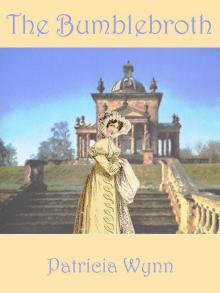 The Bumblebroth
The Bumblebroth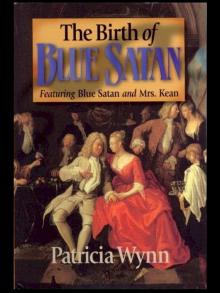 The Birth of Blue Satan
The Birth of Blue Satan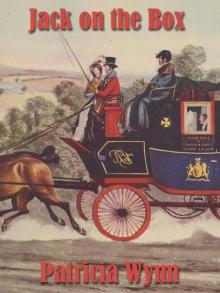 Jack on the Box
Jack on the Box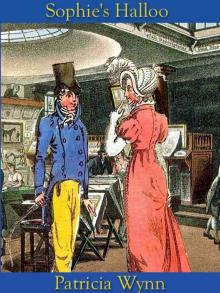 Sophie's Halloo
Sophie's Halloo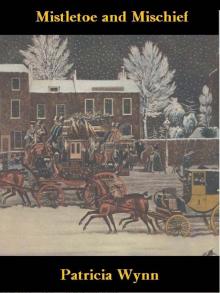 Mistletoe and Mischief
Mistletoe and Mischief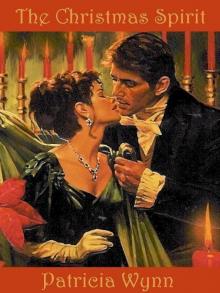 The Christmas Spirit
The Christmas Spirit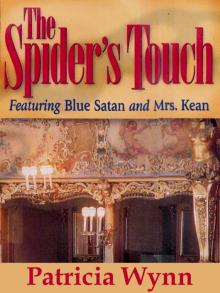 The Spider's Touch
The Spider's Touch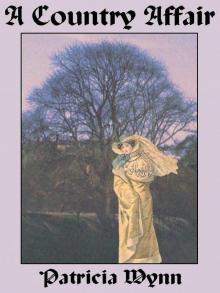 A Country Affair
A Country Affair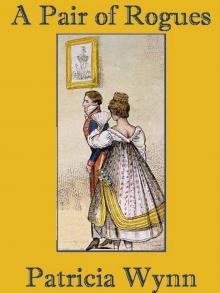 A Pair of Rogues
A Pair of Rogues